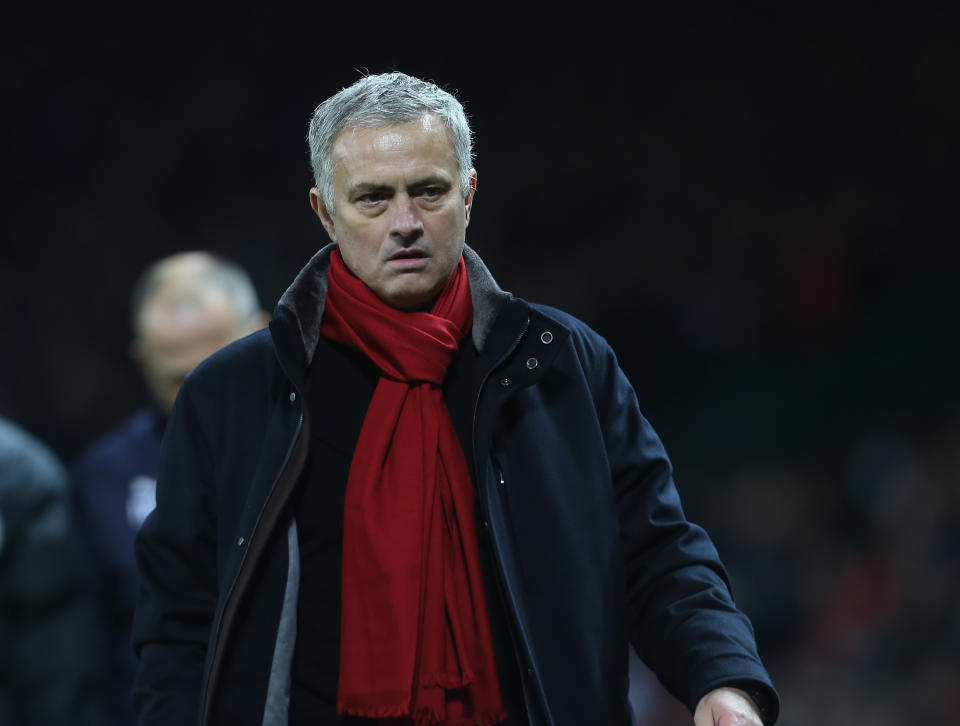Why Jose Mourinho's takes on Manchester United's insufficient spending are misguided
Jose Mourinho is a master of the spin. And when things aren’t going well – when the Manchester United manager senses a narrative beginning to turn on him – the spin master dons his figurative cap and gets to work.
That’s why Mourinho, less than an hour after a disappointing 2-2 draw with Burnley, sat at a podium talking about Manchester United’s transfer-market spending – and, specifically, arguing that it was insufficient.
“It’s not enough,” he said of the £286 million United has spent the past two summers. “It’s not enough,” he repeated, before also complaining that United’s stature forces it to overpay for players.
The context, of course, were comparisons to Manchester City, which is now running away with the league. Mourinho was asked whether his team’s recent record, which could leave it trailing its Manchester rival by 15 points, was acceptable at such a “big club.” He disputed the question, rather than admitting to his own shortcomings.
“One thing is a big club and another thing is a big football team. They are different things,” Mourinho said, implying his United side isn’t the latter. “There are many big clubs. So when you speak about responsibilities to win the Premier League, Tottenham does not have that responsibility? … Arsenal doesn’t have the responsibility to win it, Chelsea doesn’t have the responsibility to win it?
“We are in the second year of trying to rebuild a football team you know is not one of the best teams in the world,” he said.
And it’s absolutely fair to point that out. Long-term projects and gradual improvement have become increasingly difficult in an age of instant gratification. Pressure on managers often intensifies too quickly. It too often leads to panicked sackings. There’s a difference between scrutiny, which Mourinho should face, and pressure, which he should not be under. Not yet.
But then the spin master moved on to excuses. And that’s where he erred. That’s where he frequently errs. “Manchester City buy the fullbacks for the price of the strikers,” Mourinho said. The point was apparently to illustrate the difference between a “big club” and a “big team.” To explain why Pep Guardiola, also in the second year of a rebuild, was so far ahead of him.
Guardiola’s City has spent roughly £369 million on 11 first-team contributors since the Spaniard arrived in the summer of 2016. That’s more than any other club in the Premier League, and it’s not particularly close. United’s £286 million is second, but the difference is significant.
The flaws in Mourinho’s comments, therefore, aren’t the facts. Instead, they’re the framing of the facts, and the other facts left unmentioned.

A year before Guardiola – on the same timeline as Mourinho, but with more money to spend – ran away with the league, Antonio Conte – also on the same timeline, with a shallower war chest – did at Chelsea. He didn’t need City-level money. He didn’t even need a year of transition. He maximized what he had, instilled an identity and installed an effective system.
Guardiola, with an extra year and a few more big-money signings under his belt, has engineered even more dominance. He, like Conte, has taken great players and made them better. He has fit some square pegs into round holes with aplomb. He has a team playing football his way, and playing it better than anybody else in the world.
Mourinho lags behind both. The issue isn’t the players, nor their prices. Whereas Guardiola has taken a player like Kevin De Bruyne – signed by City in 2015 after a season as the top attacking midfielder in Germany – and fostered his development into the best player in the Premier League, Mourinho has taken Henrikh Mkhitaryan – signed by United in 2016 after a season as the top attacking midfielder in Germany – and buried him on the bench.
The list of contrasting examples is not short. Guardiola has transformed players he inherited, like Raheem Sterling, into world-class attackers. Fernandinho and Nicolas Otamendi are playing better than ever under his tutelage. It’s not as if Mourinho has ruined the likes of Anthony Martial, Ander Herrera, Juan Mata, Chris Smalling and Phil Jones. But hasn’t turned them into superstars.
The point isn’t that he should be expected to, either. Comparing Martial to Sterling, or Herrera to Fernandinho, to trumpet Guardiola’s developmental ability vis-à-vis Mourinho’s is unfair. But there’s a reason so many City players are having the best seasons of their respective careers. Guardiola’s philosophy, and his ability to teach it, have contributed. Mourinho’s seemingly stubborn, at times conservative ways haven’t aided United in a similar fashion.
The point is that this isn’t all about money. The difference between £369 million and £286 million, on top of two already expensive squads, is not the difference between two points dropped and 17 dropped. It’s not the difference between wrapping a title up in December and falling into a fierce scrap for fourth.
Spending isn’t a barrier to competing for a Premier League title. There are many reasons City is miles ahead of United at present. Money is merely one of them. Uncontrollable factors, like injuries, are another. And, yes, Mourinho is one as well.
– – – – – – –
Henry Bushnell covers global soccer, and occasionally other ball games, for Yahoo Sports. Have a tip? Question? Comment? Email him at henrydbushnell@gmail.com or follow him on Twitter @HenryBushnell.


